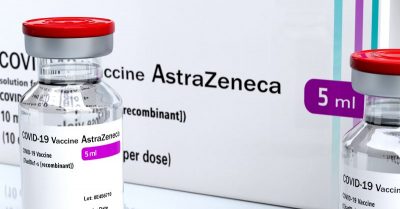U.S. Health Officials Accuse AstraZeneca of Misrepresenting Efficacy Data

In a “highly unusual” statement Tuesday, a U.S. health agency said AstraZeneca may have included “outdated information” in its clinical trial results, which may have led to the vaccine maker providing the public with an incomplete view of its efficacy data.
The statement by the National Institute of Allergy and Infectious Diseases (NIAID) came less than a day after the pharmaceutical company said its vaccine was 79% effective against COVID and 100% effective against severe or critical disease and hospitalization.
“We urge the company to work with the Data and Safety Monitoring Board (DSMB) to review the efficacy data and ensure the most accurate, up-to-date efficacy data be made public as quickly as possible,” the NIAID said.
AstraZeneca immediately responded saying the numbers published Monday were based on a “pre-specified interim analysis with a data cut-off” of Feb. 17. The company promised to “immediately engage with the DSMB to share their primary analysis with the most up-to-date efficacy data” and to issue the results of the primary analysis within 48 hours.
The DSMB is an independent expert group that sees trial data before the pharmaceutical companies, the doctors running the trials or even the U.S. Food and Drug Administration (FDA), according to CNN. It has the authority to advise a company of positive interim findings or to halt a trial over safety concerns, which is what happened to AstraZeneca last September after a study participant developed neurological symptoms.
In an interview with Good Morning America, NIAID Director Dr. Anthony Fauci explained the sequence of events. Fauci said that the DSMB and AstraZeneca reviewed the trial data together before the vaccine maker issued its press release. But when AstraZeneca issued its press release, the DSMB “got concerned and wrote a rather harsh note to them and with a copy to me saying that in fact the data that was in the press release were somewhat outdated and might in fact be misleading a bit and wanted them to straighten it out.”
That’s when NIAID issued its statement advising AstraZeneca that it “better get back with the DSMB to make sure that the correct data gets put into a press release,” Fauci said. Fauci said that DSMB picking up this discrepancy is really “a safeguard.”
In a statement to the Science Media Centre in the UK, Stephen Evans, professor of pharmacoepidemiology at the London School of Hygiene and Tropical Medicine, said that members of the DSMB sometimes disagree with investigators over vaccine trial results, but usually in private. “So this is unprecedented in my opinion,” Evans said.
As analysts scrambled to interpret the statement, one scientist claimed the U.S. government stopped just short of accusing AstraZeneca of manipulating its trial data.
“This is a highly unusual statement by the U.S. National Institute of Allergy and Infectious Diseases (NIAID). It comes close to accusing Oxford/AZ of having wilfully misrepresented some results from their recent U.S. vaccine trial,” tweeted Francois Balloux, professor and director of the UCL Genetics Institute.
This is a highly unusual statement by the US National Institute of Allergy and Infectious Diseases (NIAID). It comes close to accusing Oxford/AZ of having wilfully misrepresented some results from their recent US vaccine trial. https://t.co/cj86TYdY7e
— Prof Francois Balloux (@BallouxFrancois) March 23, 2021
According to The New York Times, companies sponsoring drug or vaccine trials typically wait for the monitoring board to review analyses and conclude that the study has yielded an answer before they announce trial results.
In recent days, the monitoring board’s analysis of the AstraZeneca trial was delayed several times because the board asked for revised reports from those handling trial data on behalf of the company. The monitoring board ultimately conveyed the results of the study to AstraZeneca in a meeting over the weekend, leading to the company’s press release Monday morning.
Dr. Eric Topol, a clinical trials expert at Scripps Research in San Diego, said it was “highly irregular” to see such a public display of friction between a monitoring board and a study sponsor. “I’ve never seen anything like this,” he told the Times after the institute’s statement was released. “It’s so, so troubling.”
According to Zero Hedge, the AstraZeneca vaccine — which is a linchpin of the World Health Organization’s effort to vaccinate poorer countries via its Bill Gates-approved COVAX initiative — once again finds itself mired in controversy. Notably, in its most recent data, AstraZeneca neglected to include key information, such as the number of trial participants who developed “severe COVID.” AstraZeneca President Ruud Dobber, during an interview on CNBC’s Squawk Box, said the number was “5,” shortly after the data were released.
“The way they handled their data early on, AstraZeneca basically shot themselves in the foot,” Julian Tang, a virologist at the University of Leicester, said even before the latest issue arose.
AstraZeneca has received criticism over its studies since the first data released in the UK, which purported to show the vaccine was 70% effective, yet failed to account for a manufacturing mistake and didn’t include enough participants over 65 to determine efficacy among older patients, reported ZeroHedge.
European governments like Germany and France responded by initially limiting the jab to patients under the age of 65. In the U.S., officials suspended AstraZeneca’s study in 30,000 Americans for an unusual six weeks last fall, as frustrated regulators sought details about neurological problems reported in Britain.
The latest controversy comes after 20 countries suspended use of AstraZeneca last week based on reports of rare blood clots, some resulting in death, in healthy people who received the vaccine. Although The European Medicines Agency (EMA) found the Oxford-AstraZeneca COVID vaccine “may be associated with very rare cases of blood clots,” it deemed the vaccine “safe and effective” and encouraged countries to use it, The Defender reported.
Two independent research teams in Norway and Germany announced Friday they identified antibodies that provoke immune reactions leading to the type of blood clots experienced by some people who received AstraZeneca’s COVID vaccine. Although many countries resumed their vaccination program with AstraZeneca’s vaccine after the EMA’s preliminary findings, some countries, including France, Denmark, Norway, Sweden and Finland, have not lifted their restrictions on its use, according to The British Medical Journal.
AstraZeneca said it would continue to analyze the new data and prepare to apply in the coming weeks for Emergency Use Authorization (EUA) from the FDA, reported the Times. If approved in the U.S. AstraZeneca would become the fourth available vaccine stateside, joining Moderna, Pfizer and Johnson & Johnson.
*
Note to readers: please click the share buttons above or below. Forward this article to your email lists. Crosspost on your blog site, internet forums. etc.
Megan Redshaw is a freelance reporter for The Defender. She has a background in political science, a law degree and extensive training in natural health.
Featured image is from Children’s Health Defense
*** This article has been archived for your research. The original version from Global Research can be found here ***


